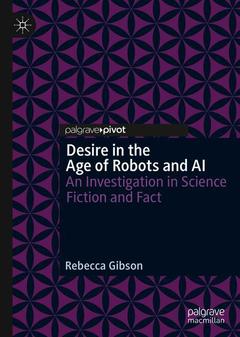Desire in the Age of Robots and AI, 1st ed. 2020 An Investigation in Science Fiction and Fact
Auteur : Gibson Rebecca

This book examines how science fiction?s portrayal of humanity?s desire for robotic companions influences and reflects changes in our actual desires. It begins by taking the reader on a journey that outlines basic human desires?in short, we are storytellers, and we need the objects of our desire to be able to mirror that aspect of our beings. This not only explains the reasons we seek out differences in our mates, but also why we crave sex and romance with robots. In creating a new species of potential companions, science fiction highlights what we already want and how our desires dictate?and are in return recreated? by what is written. But sex with robots is more than a sci-fi pop-culture phenomenon; it?s a driving force in the latest technological advances in cybernetic science. As such, this book looks at both what we imagine and what we can create in terms of the newest iterations of robotic companionship.
Chapter 1. The Gears and Wires of Robot Sex.- Chapter 2. What Defines Reality?: Robot/Android Self-Knowledge and Authenticity.- Chapter 3. Incep Dates and Pleasure Models: Death, Life, and Love in Blade Runner.- Chapter 4. Angel Replicants and Solid Holograms—Blade Runner 2049 and Its Impact on Robotics.- Chapter 5. Moving Toward an Acceptance of Robotic Sexuality through Sci-Fi.
Rebecca Gibson, PhD, is Visiting Assistant Professor of Anthropology at the University of Notre Dame, USA. She specializes in bioanthropology, and serves as a juror for the Speculative Literature Foundation’s Working Class Writers grant. Her work has been published in NEXUS, and in Sexuality & Culture.
Date de parution : 09-2019
Ouvrage de 141 p.
14.8x21 cm


